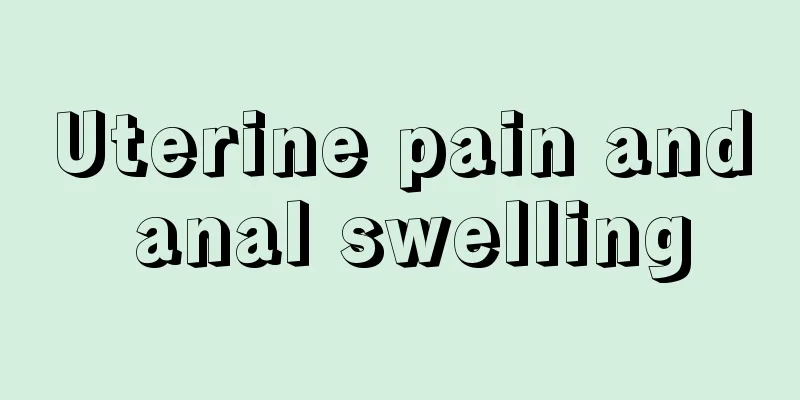Uterine pain and anal swelling

|
Anal prolapse is a kind of discomfort disease that occurs in the duodenum, anus, and perineum. Specific symptoms include: partial falling down, distending pain, discomfort, urge to urinate, crawling sensation, and burning sensation. In severe cases, symptoms may radiate to the lumbar spine and lower limbs. The disease persists for a long time and is often combined with psychiatric symptoms such as anxiety, hypochondria, insomnia and even suicidal thoughts. Anal prolapse is a common symptom of many anorectal diseases and is also one of the common complications after anorectal surgery. The causes of anal prolapse are complex and there are many uncertain pathogenic factors. It can exist independently or be accompanied by other common symptoms. There is poor efficacy in treatment and no cure has been developed. Common diseases of anal prolapse 1. Prolapsed anus disease (1) Prolapse of internal hemorrhoids, prolapse of duodenal mucosa, cysts, etc. can all stimulate the dentate area (the high-rise sensory nerve terminal tissue zone, which is the induction area of defecation movement) to cause a feeling of heaviness in the anus and thus a feeling of defecation. (2) Uterine prolapse and vaginal prolapse also often cause a feeling of falling. In patients with duodenal prolapse, the mucosa is deeply sunken into the anal canal, stimulating the peripheral nerves of the dentate line and causing a feeling of heaviness and pain. 2. Inflammatory diseases (1) Colitis, proctitis, anal cryptitis, and anal papillitis can all cause anal prolapse due to inflammation and irritation of the dentate area. (2) Duodenal submucosal cysts, pelvic duodenal lacunar cysts, etc., due to inflammation and irritation of the pelvic nerves, often cause pain in the anus and duodenum. (3) Subacute bacterial infection of prostatitis may cause pain in the vulva. (4) Foreign bodies in the anal canal and duodenum can cause bleeding and ulceration of the duodenal mucosa, difficult defecation, and anal prolapse. 3. Oppressed Disease (1) The contents of pelvic hernia are compressed into the anal canal and may cause anal prolapse. The nerve control of the duodenum and surrounding organs mainly comes from the pelvic plexus. Once the sacral nerve, which is a component of the pelvic plexus, is compressed by the herniated intervertebral disc, the patient may experience a feeling of pain and discomfort in the anus. (2) Retroverted uterus can cause anal prolapse. If blood accumulates in the duodenal uterine concavity, anal prolapse may occur. (3) In the late stage of cervical cancer, compression of the duodenum may also cause anal prolapse. 4. Surgery for irritation The cause of anal prolapse after anorectal surgery may be related to surgical treatment and inflammatory irritation of stool effectors. For example, if you experience heaviness and pain 1 to 2 days after internal hemorrhoid injection surgery, it is because the injection of medicine causes the hemorrhoids to temporarily enlarge; in mixed hemorrhoid external stripping and internal ligation, when the internal hemorrhoid ligation line has not fallen off, it can irritate the anal canal and cause urinary sensation, resulting in anal heaviness and pain; in high anal fistula incision and hanging thread surgery, in the early stage of the rubber band falling off, part of the muscles of the anus opening will be cut off, resulting in anal heaviness. After receiving negative pressure suction ligation treatment for hemorrhoids, all patients felt an unbearable anal prolapse. After complicated anal fistula surgery, large scars may cause discomfort in the anus. The main reason for the feeling of anal distension after stapled hemorrhoidectomy (PPH) is that the actual operating plane is too low, and it may also be related to stoma inflammation and duodenal stretch reflex surface. |
>>: What should I do if I feel dizzy after taking pregnancy-preserving medicine?
Recommend
What causes cervical polyps? Or these reasons
Cervical polyps are one of the common gynecologic...
What to do if you don't have endometrium
The absence of endometrium is actually a problem ...
How to retrieve eggs if fallopian tubes are blocked?
For some women, being unable to get pregnant is d...
Canalys: Global smartphone shipments will reach 1.22 billion units in 2024, a year-on-year increase of 7%
According to the latest research from Canalys, th...
If you have high blood pressure, you should eat like this!
Author: Xue Qingxin, registered dietitian Reviewe...
What to do if you feel bad before your period
Many women experience extreme mood swings during ...
A 32-year-old man suddenly suffered a heart attack and fell into a coma! Doctors remind you: These bad habits may cost you your life
"Fortunately, he was in the hospital when th...
What foods can reduce lip hair?
A normal body has darker, densely packed hair on ...
Why do I always have menstrual cramps at night?
Women's bodies are generally weak during mens...
White spots on nipples
White spots on the nipples basically occur in bre...
What is Gynecobacterium
Gynecological Streptococcus is the lactobacillus ...
What causes sagging breasts?
I am only 27 years old this year. I gave birth to...
Why is there discharge when squeezing the nipple?
We know that breast disease has been a common con...
Chest pain before menstruation
Menstruation is a normal physiological response o...
Backache before menstruation and early pregnancy
Women often feel back pain. Some women feel back ...









